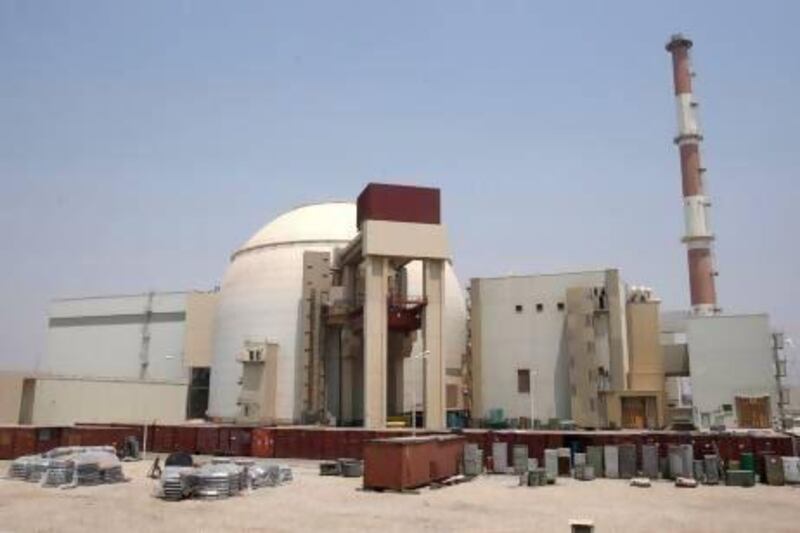The GCC yesterday called on the UN to send inspectors to Iran's Bushehr plant after a 6.3-magnitude earthquake raised fears over safety at the nuclear complex.
The quake, the aftershocks of which were felt in the UAE, Qatar, and Bahrain, had caused a "great deal of concern among GCC countries and the international community", said Abullatif Al Zayani, the GCC's secretary general, at a meeting of emergency management officials from across the Arabian Gulf in Riyadh.
The UN International Atomic Energy Agency must "send a specialised technical team to inspect the Bushehr nuclear plant and investigate potential damage", he said.
Tuesday's earthquake killed at least 37 people in Iran. The epicentre was located 96km from Bushehr, which both Tehran and the reactor's manufacturers in Russia said was not damaged.
The site at Bushehr is closer to Abu Dhabi, Kuwait City, Manama and Doha than it is to Tehran.
"The GCC countries have previously warned against the danger of the nuclear reactor of Bushehr and the possible nuclear leak and its harmful effect on the environment in the Gulf," Mr Al Zayani said.
Mr Al Zayani also urged Iran to join the UN Convention on Nuclear Safety, which would facilitate access to the power plant by the International Atomic Energy Agency. Iran remains the only nuclear power not to be a signatory of the treaty, which was negotiated in the aftermath of the Chernobyl disaster in 1986.
Iran has been a member of the IAEA since 1958 and also signed the Nuclear Nonproliferation Treaty. Both pacts allow independent inspectors to tour Iran's nuclear facilities, although Tehran has refused inspections in the past.
Fears over contamination add another level of concern to Iran's already controversial nuclear programme. Western countries have imposed sanctions on the country in protest against its wider nuclear programme, which they say could include weapons. Tehran says its programme is for peaceful purposes only.
But even if energy is the only pursuit, Gulf states say they feel vulnerable. The nuclear site is simply "too close for comfort", Abdel Aziz Aluwaisheg, the GCC assistant secretary general, wrote in an opinion piece for Saudi Arabia's Arab News timed with the Riyadh meeting.
The Gulf states sit downwind from any potential leak, and experts say there would be a risk of contamination in a nuclear incident.
"If there was an earthquake right on top of the nuclear plant, we would have had a very big problem," said Abdullah Toukan, a nuclear physicist and head of the Strategic Analysis and Global Risk Assessment Centre in Jordan. "Depending on the climate, the wind speed, it could easily contaminate the Gulf states, especially Qatar and Bahrain."
Iran sits on major fault lines and has suffered several devastating earthquakes, including a 6.6-magnitude quake in 2003 which flattened the south-eastern city of Bam and killed more than 25,000 people.
The Bushehr reactor is in an earthquake zone at the juncture of three tectonic plates, but is designed to withstand an 8.0-magnitude quake and possibly up to a magnitude of 9.0, experts from the International Institute for Strategic Studies in London reported last year.
Despite its volatile geographical location, authorities in Tehran announced after last week's earthquake that they plan to build more reactors near Bushehr.
Just hours after the earthquake, the head of Iran's Atomic Energy Organisation said more reactors would be built there. Fereydoun Abbasi-Davani declared the Bushehr site capable of holding six reactors and said construction of two more units of at least 1,000 megawatts would start there in the "near future".
Because Iran is not a member of the Convention on Nuclear Safety, Gulf officials are particularly concerned about the lack of information available about Iran's own protocols for dealing with any potential natural disaster at the site.
"Iranian officials have tried to calm fears that the earthquake could affect the nuclear reactor. However, their words were far from reassuring," Mr Aluwaisheg wrote in Arab News.
"What has been equally disturbing is the cavalier attitude of Iranian officials following the earthquake, dismissing concerns without providing tangible evidence to the contrary ... Nor are there convincing indications that Iran has contingency plans in case of nuclear accidents at this facility."
Yesterday's emergency meeting in Riyadh follows several high level sessions on emergency management in the region over the past several years. In December 2011, Gulf countries decided to establish a GCC Emergency Management Centre intended to help improve coordination.
Mr Toukan said that early warning systems would prove a vital part of any response plan.
"One of the best things one can do is keep an eye out and have some early warning systems in place to see if there is a risk of contamination in the water or atmosphere," he said.
edickinson@thenational.ae
* With additional reporting from Agence France-Presse, Associated Press and Reuters
twitter: For breaking news from the Gulf, the Middle East and around the globe follow The National World. Follow us





